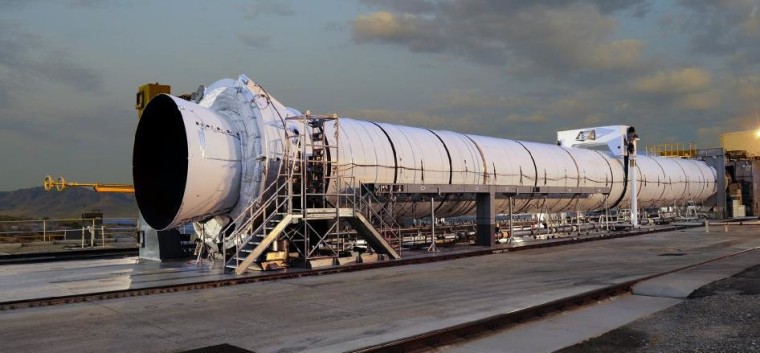A mechanical failure forced a NASA contractor on Thursday to call off the first test firing of the main part of the space agency’s powerful new moon rocket.
Officials said the test would be rescheduled for no earlier than Tuesday. "Tuesday gives us enough time to determine root cause and prepare the motor for test," Trina Patterson, a spokeswoman for Alliant Techsystems Inc., said in an e-mail advisory.
Alliant Techsystems, also known as ATK, called off the rocket burn with just 20 seconds left on the countdown clock. Operators cited failure of a power unit that drives hydraulic tilt controls for the rocket’s nozzle. The rocket was anchored to the ground in a horizontal position for the test.
It was a setback for a carefully staged event that drew thousands of onlookers. ATK hoped that the routine test of the Ares 1 first stage would prove the performance of a new program for space exploration. The Ares program is currently under review, and there's a chance that the finished rocket may never fly because of NASA budget problems.
Problem traced to valve
There was no indication anything was wrong with the rocket itself, which packs 1 million pounds of chemical propellant, enough to boost a 321-foot-long vehicle 190,000 feet into the atmosphere.
At a news conference in Utah, officials said the power unit for the nozzle controls, which steers a rocket in flight, was robbed of fuel, apparently because of a faulty valve.
That had immediate implications for the space shuttle, which uses a nearly identical system.
Officials in Utah notified their counterparts at the Kennedy Space Center in Florida, where NASA has had to delay the launch of Discovery twice — first because of stormy weather, and then due to a problem with a different type of fuel valve on the shuttle.
The Ares test problem could introduce a new delay in Discovery's launch. Shuttle managers said Thursday that they will examine what went wrong with Ares and decide by midday Friday whether to go ahead with a launch set for 11:59 p.m. ET Friday.
In Utah, ATK executives said their valve problem had never before emerged to scrub a rocket’s test firing. Engineers could have fired the rocket anyway, but they halted the two-minute burn because they wouldn’t have been able to test the agility of the rocket nozzle.
“This test is really important to the program, and it’s a rare occurrence to have a problem with a booster,” said Charlie Precourt, ATK's general manager for launch systems, who was a four-time shuttle astronaut. “We should have this sorted out shortly.”
Alex Prisko, a NASA manager for the Ares booster rocket, said the delay would add no more than a few million dollars to the $75 million cost of making and testing the rocket.
Centerpiece of moon plan
The Ares rocket is the centerpiece of the plan started by President George W. Bush to send astronauts back to the moon by 2020 and then on to Mars. An independent panel will lay out options for the Ares program as well as all of NASA’s human space program in a report due to be released by Monday.
Some space experts expect the Ares rocket program to be modified or canceled. But Thursday’s glitch won’t be a reason for that, experts said. Two former top NASA officials said such problems, delays and outright failures are common in tests of new rockets and are nothing to worry about.
“The development of all launch vehicles is spotty and checkered at best,” said Scott Hubbard, once director of NASA’s Ames Research Center and now a professor of astronautics and aeronautics at Stanford University. “The fact that they are having troubles is not surprising at all.”
Even after more than 125 flights, the space shuttle encounters glitches that force launch delays, Hubbard pointed out.
Former NASA associate administrator Alan Stern, now associate vice president of Southwest Research Institute of San Antonio, said the company was prudent in not pushing with the test.
“This is a big deal, if it goes badly there are serious consequences,” Stern said. But he said a delay in a test isn’t necessarily a bad thing and shouldn’t affect the White House’s decision on whether to continue with the Ares program.
“This is a normal occurrence,” Stern said.
More on Ares rocket | space shuttle
